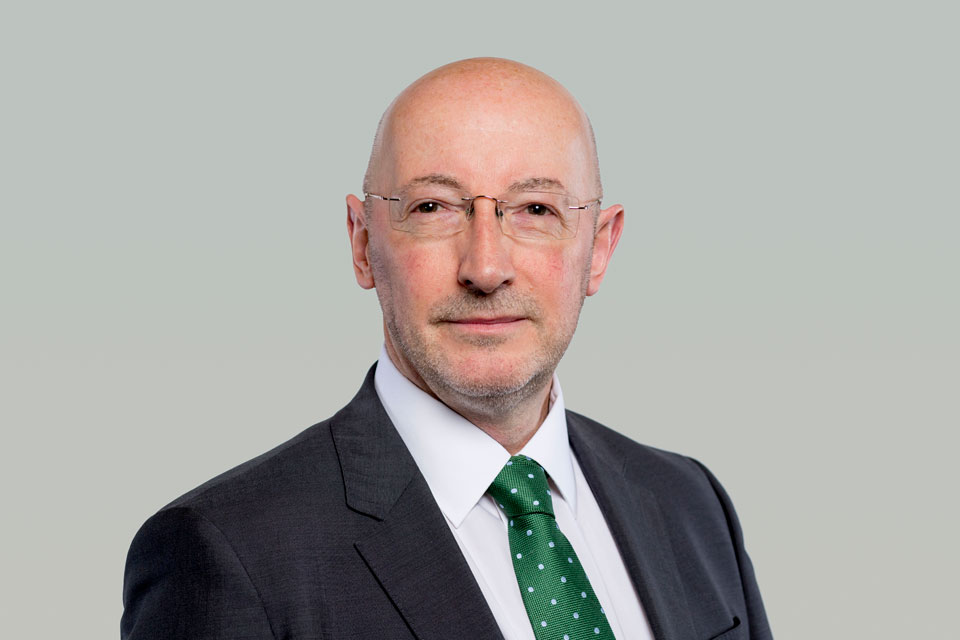Assessment of long-term tech overhaul concludes that scheme is on track and represents good value
Credit: HMRC
HM Revenue and Customs chief executive Jim Harra has concluded that the department’s five-year programme to migrate from physical datacentres to the cloud is “value for money and deliverable”.
The tax agency’s boss (pictured above) has provided an assessment summary on the HMRC’s Securing Our Technical Programme. These assessments are mandatory for any new or altered programmes of work in the government’s major projects portfolio.
Securing Our Technical Future is, according to Harra, “a five-year programme to secure the technical future of HMRC’s IT services by removing technical debt, reducing reliance on non-government owned datacentres, and migrating eligible services to cloud”.
The scheme will see the department move large volumes of services and data from its existing datacentre environment – which is largely comprised of Fujitsu infrastructure – to Crown Hosting Data Centres co-location facilities or public cloud from Microsoft and Amazon Web Services.
Related content
- HMRC approved for £112m Microsoft spending
- HMRC chief defends tax agency’s data storage deal with Amazon Web Services
- HMRC offers £115k each for quartet of tech chiefs to drive transformation
“The programme will update HMRC’s current ageing, and increasingly out of support, IT estate,” Harra said. “The existing estate, comprised of more than 600 services, lacks agility and is costly to run. Changes delivered by the programme will allow HMRC to generate more cost-effective arrangements with suppliers, while ensuring a more resilient and flexible infrastructure.”
As part of major project assessments, accounting officers are required to review the programme in question’s regularity, propriety, value for money, and feasibility.
Harra’s report – which he said was somewhat based on the findings of his predecessor as CEO, Sir Jon Thompson, who conducted a full review in June 2018 – endorsed the project’s credentials on all fronts.
Of the cloud-migration scheme’s value for money, he said: “[It] offers the highest potential to meet critical success factors and minimise IT delivery risks for HMRC, providing best value for money.”
He indicated that the plan had been compared with three other options, one of which was to “do nothing”.
He acknowledged “there are significant delivery challenges to successfully managing a complicated datacentre migration and transformation involving numerous stakeholders and delivery partners”.
But he claimed work so far is on track, and on target for timely delivery.
“The programme has already delivered several milestones and has successfully crossed several assurance and approvals hurdles, including an independent assurance review and HM Treasury approval of the business case,” he said. “Further independent assurance reviews and HMT approvals are planned at appropriate points throughout its lifetime.”
Harra added: “The programme leadership, supported by delivery partners, has the skills and experience needed to ensure the technical feasibility of the project deliverables and achieve the major milestones in the timeframe.”
Delivering the aims of Securing Our Technical Future – which was formerly known as the Columbus Cloud programme – has been an ambition of HMRC for several years.
However, the urgency of the department’s Brexit-related work imperilled the scheme; as of mid-2018, delivery of the migration programme was being “reconsidered”. It was one of more than 100 transformation projects that were halted, paused, or merged as part of a review and reprioritisation exercise.
But the programme is now seemingly back on track, and the department has previously set a target of completing migration by June 2022. However, this date was specified in a contract published last year that described the project as “three-year programme” – two years shorter than the timeframe indicated by Harra in his assessment summary.
The HMRC chief executive said he would provide an updated assessment if any of the factor’s related to the scheme’s successful delivery “change materially during the lifetime of the programme”.




https://oragoda.tistory.com/entry/토스-정부지원금-찾기-조회하는-방법
https://madreviewer.tistory.com/entry/갤럭시-S22-울트라-유출-총정리
벼룩시장 신문그대로보기 (구인구직, 부동산) 벼룩시장 신문그대로보기 바로가기 그리고 지역별 벼룩시장 종이신문그대로보기 방법 (구인구직, 부동산) 알아볼게요. 교차로신문 같이 벼룩시장은 지역별 일자리, 구인구직, 부동산 등 다양한 정보를 제공해요. 교차로신문그대로보기 바로가기는 아래에서 확인하고, 오늘은 벼룩시장 신문그대로보기 바로가기 그리고 사용법 섹스카지노사이트
충무로출장업소
https://itgunza.com/200
https://download.beer/wp-content/uploads/2020/11/daangn-image-1.png
https://infohelpforyou.com/ec958cebb094ecb29ceab5ad-eb8c80eab5ac/
https://madreviewer.tistory.com/tag/아이폰IOS
http://dnolife.net/
https://kr.new-version.app/download/goclean/comment-page-2/
https://kakaotaxi.dasgno.com/kakao-fee
https://bestkkultip.tistory.com/32
https://www.ohgunstory.com/entry/ED959CECBBB4-ED8380EC9E90EC97B0EC8AB5-EAB28CEC9E84-ED9598EAB8B0
청도페이스라인출장
Buy professional outstanding proxies – Thoroughly anonymous ELITE private proxies with TOP a higher level basic safety sole by DreamProxies.com
벼룩시장 신문그대로보기 (구인구직, 부동산) 벼룩시장 신문그대로보기 바로가기 그리고 지역별 벼룩시장 종이신문그대로보기 방법 (구인구직, 부동산) 알아볼게요. 교차로신문 같이 벼룩시장은 지역별 일자리, 구인구직, 부동산 등 다양한 정보를 제공해요. 교차로신문그대로보기 바로가기는 아래에서 확인하고, 오늘은 벼룩시장 신문그대로보기 바로가기 그리고 사용법 섹스카지노사이트